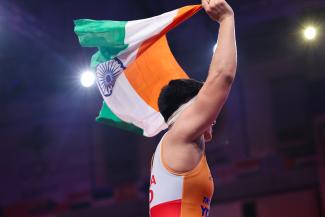The Return of Rassadin and the Breakthrough of Baltuev
Thursday, January 27, 2022 - 17:10 By Russian Wrestling Federation

KRASNOYARSK, Russia (January 27) -- The international freestyle wrestling tournament "'22 Grand Prix Ivan Yarygin" started today. The finalists for 57kg, 61kg and 70kg. were reported by www.wrestrus.ru.
At 57kg, Olympic champion Zaur UGUEV (RUS) was released from the competition. In his absence, the champion of Russia in 2019, Ramiz GAMZATOV(RUS) and Akhmed IDRISOV (RUS), who performed brilliantly in juniors, reached the final. It will not be easy to name the favorite in this confrontation, the chances of the athletes are equal.
In the 61kg weight class, the world's weight leader, the current world and European champion Abasgadzhi MAGOMEDOV (RUS) confidently reached the final, where he'll face Fedor BALTUEV, who is full of determination. He had a rather bright day today, and in the semi-finals in the match with the representative of Kyrgyzstan, Ulukbek ZHOLDOSHBEKOV, where he pulled out a victory in the last seconds. Of course, Magomedov looks like the favorite, but Baltuev will strive to create the main sensation of the tournament.
Some time ago, there were active rumors that Viktor RASSADIN (RUS) was close to the end of his career. Today, he proved that he is still ready for exploits on the carpet - Rassadin will compete in the finals of the Yarygin tournament at 70kg. His opponent will be Anzor ZAKUEV (RUS), who started quite brightly on the mat. In 2016, he became the closest wrestler to pick up a victory over Soslan RAMONOV (RUS), but up to this point he still has not reached serious results. Tomorrow he has a big chance to become the winner of the Yarygin Memorial.
Friday's Final Matchups:
57kg: Ramiz GAMZATOV(RUS) vs. Akhmed IDRISOV (RUS),
61kg. Fedor BALTUEV (RUS) vs. Abasgadzhi MAGOMEDOV (RUS)
70kg. Victor RASSADIN vs. Anzor ZAKUEV
Fedorova, Sokolova, Isakova, Ologonova and Tsyrempilova Reach Day One Finals
On the women's side of the competition, the preliminary and semi-final matches were held for 50kg, 55kg, 59kg and 65kg.
Women's Wrestling Finals:
50kg. Anzhelika FEDOROVA (RUS) vs. Nadezhda SOKOLOVA (RUS)
55 kg. Ekaterina ISAKOVA (RUS) vs. Irina OLOGONOVA (RUS)
59 kg. Zhargalma TSYREMPILOVA (RUS) vs. Tatyana KOLESNIK (AZE)
65 kg. Forrest MOLINARI (USA) vs. Emma Patricia BRUNTIL (USA)
For up to date news, highlights results from this year's Ivan Yariguin, visit www.wrestrus.ru.


Share your thoughts.
Comments